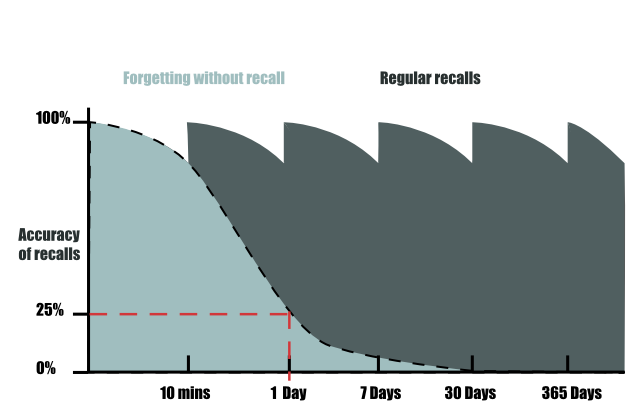
12 Apr A New Approach to Cleaner Training
Our brain is quite a remarkable organ: it constantly receives input from our senses, and actively sort through the mountain of information and make decisions whether to keep or discard it. The vast majority of this information is simply discarded and forgotten. Forgetting is a natural process and even a desirable one for information that quickly loses its relevance after a short period of time. Sometimes we wish we could forget painful or embarrassing memories.
Sadly, it is a fact that employees quickly forget the majority of what they have learnt after training. Research shows that on average students forget around 70-75% of the content within a day. Why do we remember some things so clearly and not others? We’ve just seen that your brain has to make a choice of what memories to keep and what to forget, it doesn’t really know what bits of information will be useful in the long time. As a result, some important memories are discarded like preverbal baby with the bathwater.
How can we encourage students to retain the knowledge they have learnt?
All is not lost, it is possible to ‘tell’ the brain to retain a particular piece of information. Research has shown that when students actively recall information within a short period of time after the initial training, they are much more likely to retain the information. Active recall is a deliberate process of applying the knowledge in the working environment (in real life). This could take the form of quizzes, practical application with or without supervision, refresher sessions, or learning resource documents and guides.
In the figure, you can see that without any active recall the knowledge is quickly discarded, but with active and regular recall, even the simplest reminders, can make a massive difference to memory retention.

Use it or Lose It
Why does active recall cause the brain to retain information? The thought is that deliberate and active recall encourages the brain to tag that information as important and useful. This helps the brain sift through and purge the rest you don’t recall. If you use it, you won’t lose it!
Moving Forward
Training should never be seen as an isolated event where students learn and then left to their own devices. With it being up to the individual student to retain the information and recognise when and where to apply it.
With this in mind, the most effective cleaner training focuses not just on skills and knowledge but something much deeper – behavioural change. It’s not enough to teach students the ‘Dos’ and Don’ts’, to create real behavioural change, they must learn, understand why, and apply it to the job. Understanding why something needs to be done and the importance of it helps their brain see it as important and tag for retention. What happens after the training is equally as—if not more—important than what happens in the training. We can supply the training to bring about behavioural change and we can supply post-training learning resource documents and practical application guides to enable long term skill retention.

